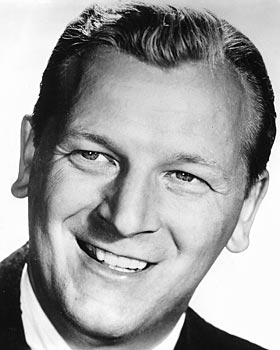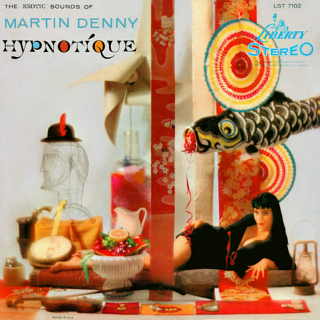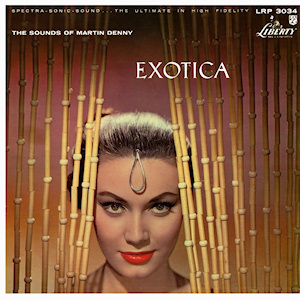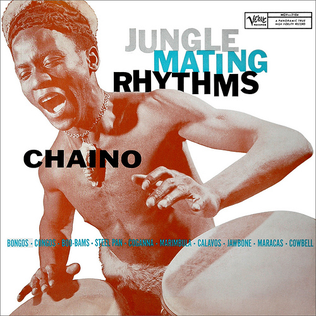
Leslie Thompson Baxter was an American musician, composer and conductor. After working as an arranger and composer for swing bands, he developed his own style of easy listening music, known as exotica and scored over 250 radio, television and motion pictures numbers.
Martin Denny was an American pianist, composer, and arranger. Known as the "father of exotica," he was a multi-instrumentalist and could play a number of percussion instruments. In a long career that saw him performing up to 3 weeks prior to his death, he toured the world popularizing his brand of lounge music which included exotic percussion, imaginative rearrangements of popular songs, and original songs that celebrated Tiki culture.
Arthur Lyman was a Hawaiian jazz vibraphone and marimba player. His group popularized a style of faux-Polynesian music during the 1950s and 1960s which later became known as exotica. His albums became favorite stereo-effect demonstration discs during the early days of the stereophonic LP album for their elaborate and colorful percussion, deep bass and 3-dimensional recording soundstage. Lyman was known as "the King of Lounge music."
Exotica is a musical genre, named after the 1957 Martin Denny album of the same name that was popular during the 1950s to mid-1960s with Americans who came of age during World War II. The term was coined by Simon "Si" Waronker, Liberty Records co-founder and board chairman. The musical colloquialism exotica means tropical ersatz, the non-native, pseudo experience of insular Oceania, Southeast Asia, Hawaii, the Amazon basin, the Andes, the Caribbean and tribal Africa. Denny described the musical style as "a combination of the South Pacific and the Orient...what a lot of people imagined the islands to be like...it's pure fantasy though." While the South Seas forms the core region, exotica reflects the "musical impressions" of every place from standard travel destinations to the mythical "shangri-las" dreamt of by armchair safari-ers.
Lounge music is a type of easy listening music popular in the 1950s and 1960s. It may be meant to evoke in the listeners the feeling of being in a place, usually with a tranquil theme, such as a jungle, an island paradise or outer space. The range of lounge music encompasses beautiful music-influenced instrumentals, modern electronica, while remaining thematically focused on its retro-space age cultural elements. The earliest type of lounge music appeared during the 1920s and 1930s, and was known as light music.

Katy Lied is the fourth studio album by American rock band Steely Dan, released by ABC Records in March 1975; reissues have been released by MCA Records since ABC Records was acquired by MCA in 1979. It was the first album the group made after they stopped touring, as well as their first to feature backing vocals by Michael McDonald.

Hypnotique is the fifth album by Martin Denny. Released on Liberty Records in 1959, it was recorded in 1958 at the Kamehameha Schools auditorium and at the Liberty Studios in Hollywood.
"Pet Sounds" is an instrumental by American rock band the Beach Boys from their 1966 album Pet Sounds. Composed by Brian Wilson, it was originally called "Run James Run", as Wilson intended it to be used as the theme of a James Bond film. It was then titled "Pet Sounds", the title of the album on which it appears. It is the second instrumental to feature on Pet Sounds, the other being "Let's Go Away for Awhile".

Exotica is the first album by Martin Denny, released in 1957. It contained Les Baxter's most famous piece, "Quiet Village", and spawned an entire genre bearing its name. It was recorded December 1956 in Webley Edwards' studio in Waikiki. The album topped Billboard's charts in 1959.

Exotica Volume II was the second album by Martin Denny, released in 1958.
Gene Rains is a vibraphonist and leader of the Gene Rains Group, a jazz quartet from Hawaii that played a musical style known as Exotica. Rains' short career spanned the early to the mid-1960s and consisted of 4 LP recordings released on Decca Records and the Vocalion label. These LPs were released during the golden era of Hawaiian and Exotica music and the Tiki culture in the United States. The Gene Rains Group repertoire featured popular Hawaiian and Polynesian Island melodies as well as popular American tunes of the era.

Simon Hugh Zentner was an American jazz trombonist and big-band leader.
"Quiet Village" is an orchestral pop instrumental that was written and originally performed by Les Baxter in 1951 and an instrumental album from 1959 by Martin Denny. In the liner notes to his album, Ritual of the Savage , Baxter described the themes he was conveying in the work:
[t]he jungle grows more dense as the river boat slowly makes its way into the deep interior. A snake slithers into the water, flushing a brilliantly plumaged bird who soars into the clearing above a quiet village. Here is a musical portrait of a tropical village deserted in the mid-day heat.

Takeshi "Tak" Shindo was an American musician, composer and arranger. He was one of the prominent artists in the exotica music genre during the late 1950s and early 1960s. Shindo also founded a dance band in 1947 and was a frequent lecturer and writer on Japanese music. He first gained prominence for his work on the 1957 motion picture Sayonara, served as the musical director for the television series Gunsmoke, and composed theme music for The Ed Sullivan Show and Wagon Train. He is most remembered for the exotica albums he released from 1958 to 1962, including Mganga! The Primitive Sounds of Tak Shindo (1958), Brass and Bamboo (1959) and Accent on Bamboo (1960). He also released several albums in Japan during the mid-1960s that blended American and Japanese musical traditions. During the 1950s and 1960s, Shindo was a columnist for the Rafu Shimpo covering classical and popular music. In 1980, Shindo made a documentary film, Encounter with the Past, about the Manzanar relocation camp where he was relocated in 1942 as part of the Japanese American internment policy.

Leon "Chaino" Johnson, the self-styled "percussion genius of Africa," was an American bongo player. After touring for several years on the Chitlin' Circuit, he released several albums and became popular with listeners of exotica music in the late 1950s and early 1960s. In the promotion of his albums, a fictional biography was developed, depicting Chaino as an orphan from a lost tribe in central Africa who had been rescued by a missionary after his tribe had been massacred. Chaino was actually born in Philadelphia and raised in Chicago.

Orienta is an album by The Markko Polo Adventurers released in 1959. The album was produced by Simon Rady, arranged and conducted by Gerald Fried and recorded in stereo in Hollywood, California. The album uses a combination of sound effects and Asian-inspired music to tell humorous vignettes. Its suggestive cover art features a photograph by Murray Laden.

Quiet Village: The Exotic Sounds of Martin Denny was the eighth album by Martin Denny. Released in the summer of 1959, the monophonic version of the album reached No. 21 on the Billboard monophonic album chart in November 1959, and the stereophonic version reached No. 12 on the magazine's stereophonic album chart in January 1960.

Forbidden Island was the third album by Martin Denny. The album was produced in March 1958 at the Liberty Studios in Hollywood, following the group's nine-month gig performing at Don the Beachcomber's Bora Bora Lounge in Hawaii. Forbidden Island was Denny's first album to be recorded and released after vibraphonist Arthur Lyman left the group to pursue his own solo career. The album includes four original compositions by Denny: "Cobra", "Exotica", "Primitiva", and "Forbidden Island".
August "Augie" Borero Colon was an American musician known for his work as a percussionist in the exotica genre. He came to national fame as a member of Martin Denny's band in the 1950s and was the voice behind the bird calls and jungle sounds of the hit single "Quiet Village". He also recorded two solo albums, Sophisticated Savage (1959) and Chant of the Jungle (1960). In the early 1960s, Colon left Denny's group and toured with his own band known as The Tropicales.

Jewels of the Sea is a 1961 orchestral exotica album by American composer Les Baxter. The album was inspired by fantasy ideas of the ocean from pop culture, such as mermaids and sea nymphs, sunken ships, and legendary underwater cities such as Atlantis. There was an overall erotic element to the album, whose tagline was "Titillating Orchestrations for Listening and Loving", and whose original cover featured actress and model Diane Webber smiling glamorously underwater, apparently naked. Although not explicitly shown wearing a mermaid tail, her makeup and jewellery are styled to be reminiscent of the performing mermaids at Weeki Wachee Springs.












